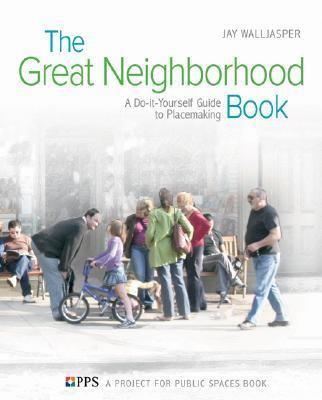
The Great Neighborhood Book
 Daddy gave me Jay
Walljasper's The
Great Neighborhood Book a few years ago on the
understanding I'd review it on our blog. Unfortunately, there
weren't enough plants and non-human animals in the book to move it out
of my slush pile, so it sat there until our
failed intern experiment got me thinking that I
needed to learn more about community-building.
Daddy gave me Jay
Walljasper's The
Great Neighborhood Book a few years ago on the
understanding I'd review it on our blog. Unfortunately, there
weren't enough plants and non-human animals in the book to move it out
of my slush pile, so it sat there until our
failed intern experiment got me thinking that I
needed to learn more about community-building.
It turns out I could
have sucked the marrow out of The
Great Neighborhood
book in just a few hours, but the long wait was no big loss because
there is, unfortunately, absolutely nothing for rural dwellers in the
whole text. In fact, Walljasper is one of those folks who
believes that cities are the only solution to environmental problems (a
stance I tend to disagree with since the extra car use in rural areas
can easily be offset by working online and growing your own food).
Anyway, rants aside, I
love the idea of turning neighborhoods into interconnected villages,
and I wish someone would write a similar book for the
countryside. While I'm waiting for The
Great Neighborhood: The Rural Edition, a few of Walljasper's tips
might carry over to our habitat. For example, a neighborhood
listserv (or, in this day and age, perhaps a facebook page) could help
people communicate more, and Mark's always wanted to get folks on our
little road together once a month for a potluck.
On the other hand, if
you live in a suburb or urban area, I highly recommend at least
flipping through this easy-to-read book to get ideas for turning your
neighborhood around. Learn how putting a bench in front of your
house or waving at people passing by can turn up new friends, decrease
crime, and slow traffic. Walljasper might change your mind about
dogs (good for neighborhoods) and wide roads (bad for neighborhoods),
and the case studies will definitely inspire you to get out there and
make change.
Do you have a suggestion
for a more rural-based community-building book? I suspect someone
out there has done as good a job with that topic as Walljasper did with
the city neighborhood.
Want more in-depth information? Browse through our books.
Or explore more posts by date or by subject.
About us: Anna Hess and Mark Hamilton spent over a decade living self-sufficiently in the mountains of Virginia before moving north to start over from scratch in the foothills of Ohio. They've experimented with permaculture, no-till gardening, trailersteading, home-based microbusinesses and much more, writing about their adventures in both blogs and books.
Want to be notified when new comments are posted on this page? Click on the RSS button after you add a comment to subscribe to the comment feed, or simply check the box beside "email replies to me" while writing your comment.

Facebook makes its money by selling data about you. You are not their customer, but their product. So if you value online privacy (such as it is, and what there is of it) don't go on facebook. Be aware that social networking sites like facebook and twitter and advertisement sellers like google track you wherever you go online. For that reason I advise anybody to install a script blocker (like e.g. noscript for firefox) in their browser so you can decide what to allow on which sites.
Mailing lists are more private. You can choose to join. And the administrator can choose wether to make the archives available online. There are excellent free mailing list programs available, like mailman.
Roland --- I totally agree, and I don't use Facebook for anything personal. Unfortunately, Facebook seems to have won the social networking war, at least among the folks I know, so if you want to social network, it's your best option. (I mostly just choose not to social network. )
)
I wish email lists would make a comeback, since I vastly prefer them. But my understanding is that young people these days don't even use email at all! For them, it's all texting or using Facebook messages.
Our neighborhood uses Nextdoor. I believe it lets someone define the neighborhood area however big or small you want it to be. There are no ads or anything and it's private so people have to be verified to actually live there to be accepted to the small list. It may be worth looking into if you have time.
nextdoor.com
One of my favorite community building books is "Creating a Life Together" by Diana Leafe Christian. She has done a lot of consulting work with intentional communities, helping them overcome conflicts, work their way through intractable conflicts, and there is even a thorough discussion on finding land and setting up legal arrangements. I love this book because it is so practical. There are case studies from several different types of communities, both rural and urban/cohousing, and all sorts of different social arrangements (income sharing, tenant situations, etc). It's a really good book to give you a realistic view of community life. Finally, the resources section is incredibly helpful.
I know I've probably recommended it on your blog before, but if you haven't yet read it, then I definitely recommend it now.